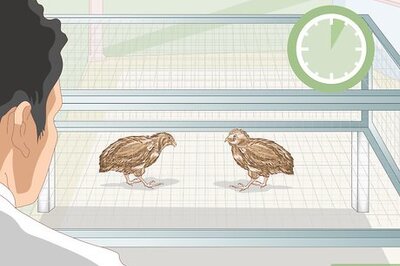
views
Aboard US military aircraft: Commanders of NATO operations in Libya believe forces loyal to ousted leader Muammar Gaddafi are on the verge of defeat in Sirte, a key milestone for ending alliance military operations, a senior US defense official said.
The commanders' assessment was delivered to US Defense Secretary Leon Panetta, who was visiting the US Navy base at Naples, Italy, that serves as headquarters for the 6th Fleet. He was briefed on the status of air and sea operations aimed at protecting Libyan civilians from attacks by Gaddafi loyalists, said the official, who spoke on condition of anonymity.
Commanders told Panetta in closed-door sessions that Gaddafi, whose exact whereabouts are unknown, effectively has no nationwide command and control over militias who support him, the official said.
Gaddafi loyalists in the city of Sirte, the last major concentration of resistance to Libya's new rulers, are likely to be defeated within days or weeks, the official said.
The defeat of Gaddafi supporters in Sirte is a key milestone in deciding when to end NATO's Operation Unified Protector, which includes a no-fly zone, air strikes against forces attacking civilians and a maritime arms embargo.
"Everyone understands that this is entering a new phase in the near future," the defense official said.
Panetta on Thursday cited several factors being weighed as NATO leaders decide when to end their UN-sanctioned operations in Libya.
In addition to the defeat of Gaddafi loyalists in Sirte, they included an assessment of whether Libyan civilians faced any additional threats and whether the ruling Transitional National Council could provide security and governance.
Outside help needed with Libyan security?
Commanders told Panetta the TNC was improving in its ability to provide security and governance but still needed to take additional steps to ensure it can provide security in the long term, the defense official said.
That may require some outside assistance, the official said, without elaborating on the nature of such assistance or which countries might provide it.
Panetta, the former CIA director, visited the Navy base at Naples after a two-day meeting in Brussels with other NATO defense ministers, his first since taking over his new job in July.
He later flew to Naval Air Station Sigonella in Sicily, where he spoke with a group of international military personnel involved in flying Global Hawk unmanned aerial reconnaissance missions over Libya.
In remarks to military personnel at the base, Panetta said the consensus in Brussels was that "NATO really proved itself" with the Libya operation and showed opponents of the operation were wrong.
"At the time this mission was embarked on, there were a lot of critics about whether it was the right mission at the right time with the right force, whether NATO could do the job," Panetta said. "I think the critics have really been proven wrong."
One of those early critics was former Defense Secretary Robert Gates, who initially opposed US involvement in Libya before President Barack Obama decided to join the operation.
Panetta twice made references to the CIA's widely discussed but rarely acknowledged use of Predator drones, which have been involved in attacks targeting al Qaeda and Taliban leaders in Yemen, Pakistan and elsewhere.
"Having moved from the CIA to the Pentagon, obviously I have a hell of a lot more weapons available to me in this job, although the Predators are not bad," he joked in remarks to US military personnel in Naples.
Speaking to personnel at Sigonella while standing in front of a Global Hawk drone, Panetta discussed the sophistication of the Libya operation, which involved "the use of Global Hawks like the one behind me, the use of Predators, which is something I was very familiar with in my past job."
As he was meeting with troops, a Predator took off from the base.
Global Hawks are high-altitude surveillance drones capable of giving commanders a broad, strategic view of the battlefield and large troop movements. Predators are armed tactical unmanned aircraft that can be used to track and attack individuals and small groups.




















Comments
0 comment